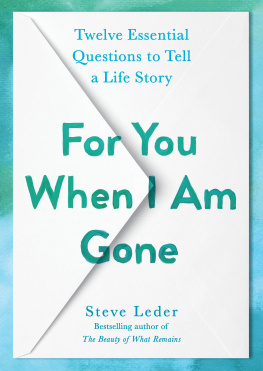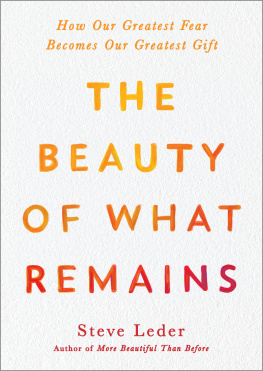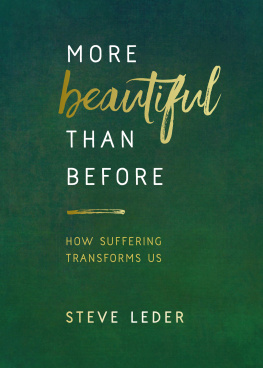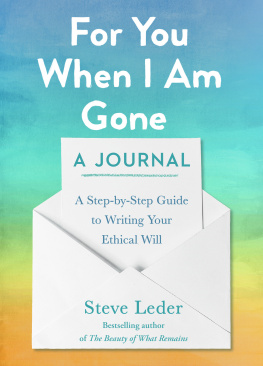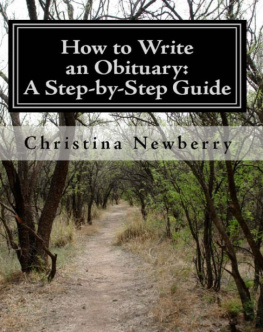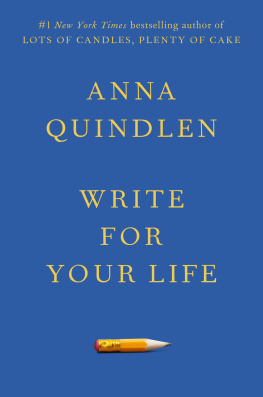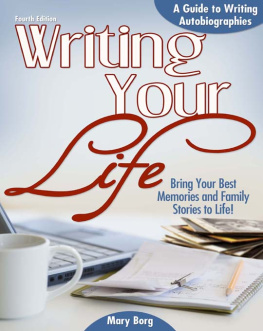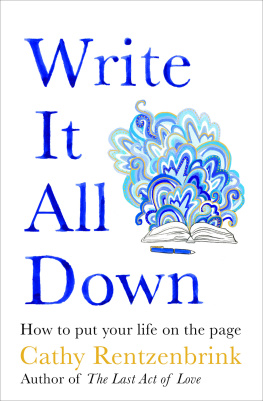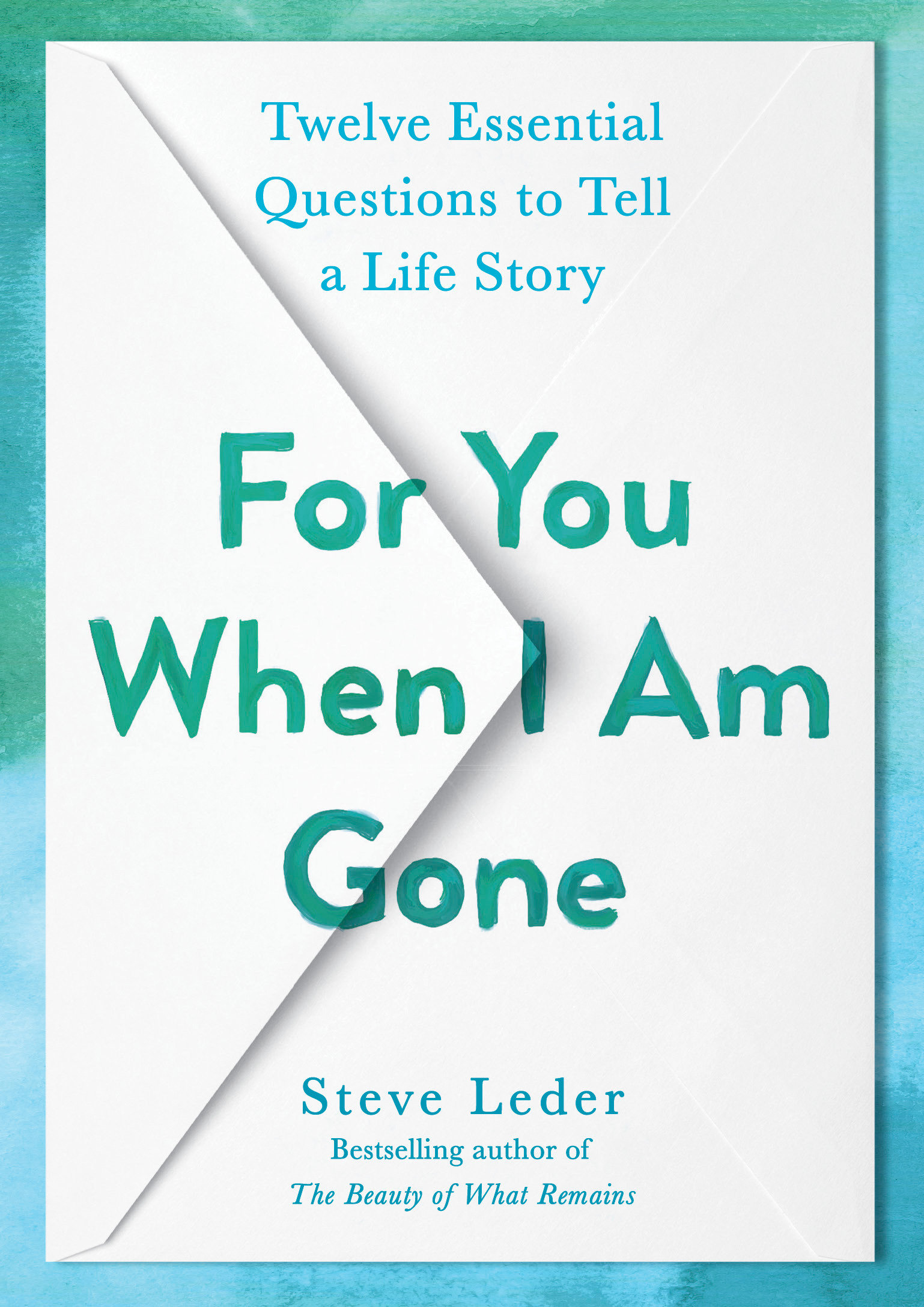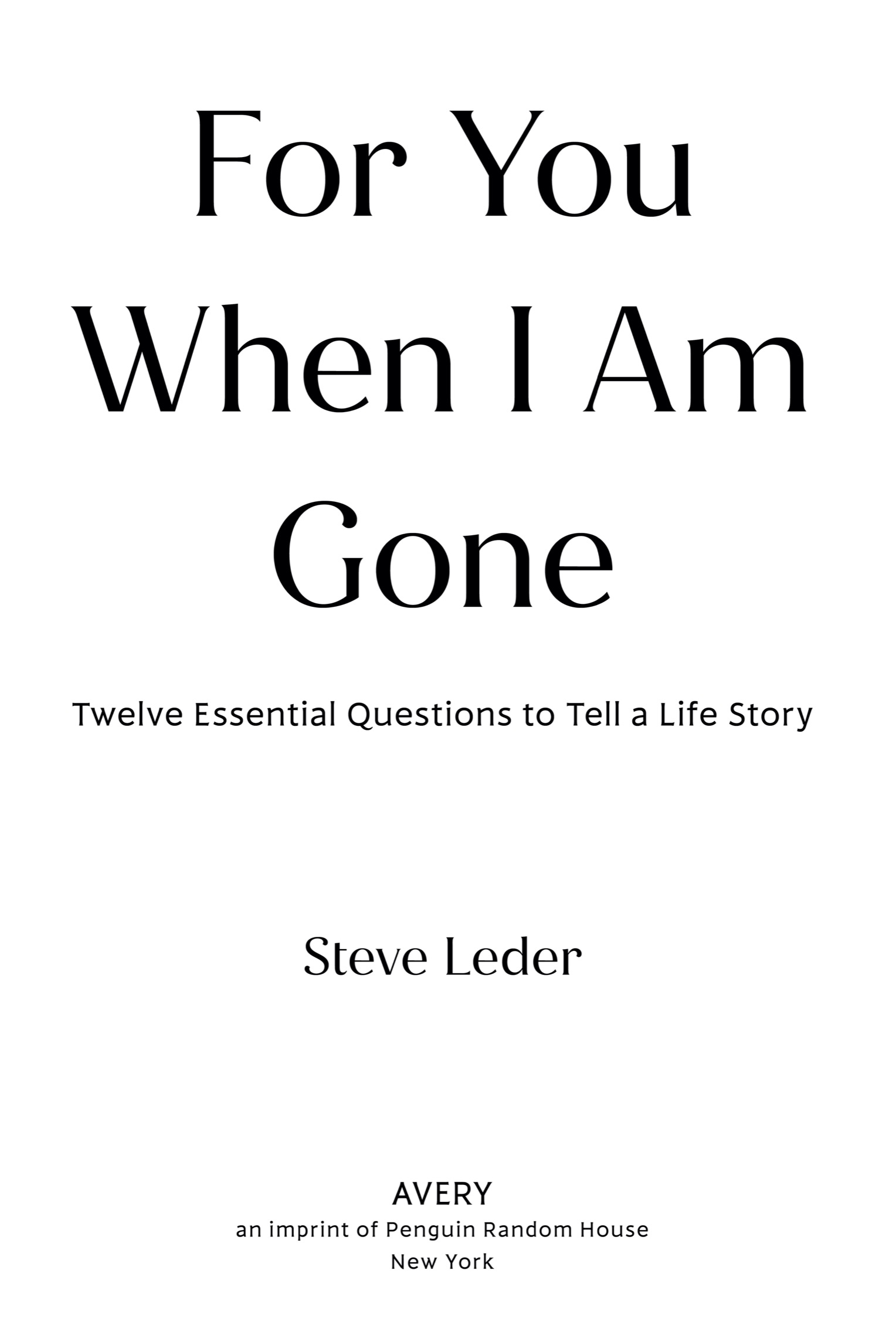
An imprint of Penguin Random House LLC
penguinrandomhouse.com
Copyright 2022 by Steve Leder
Penguin Random House supports copyright. Copyright fuels creativity, encourages diverse voices, promotes free speech, and creates a vibrant culture. Thank you for buying an authorized edition of this book and for complying with copyright laws by not reproducing, scanning, or distributing any part of it in any form without permission. You are supporting writers and allowing Penguin Random House to continue to publish books for every reader.
constitutes an extension of this copyright page.
Names: Leder, Steven Z., author.
Title: For you when I am gone: twelve essential questions to tell a life story / Steve Leder.
Description: New York: Avery, an imprint of Penguin Random House, 2022.
Identifiers: LCCN 2022004928 (print) | LCCN 2022004929 (ebook) | ISBN 9780593421550 (hardcover) | ISBN 9780593421567 (epub)
Subjects: LCSH: DeathPsychological aspects. | Mourning customs. | Funeral rites and ceremonies.
Classification: LCC BF789.D4 L38 2022 (print) | LCC BF789.D4 (ebook) | DDC 155.9/37dc23/eng/20220208
LC record available at https://lccn.loc.gov/2022004928
LC ebook record available at https://lccn.loc.gov/2022004929
Cover design: Victoria Black
Cover image: (envelope) Mega Pixel / Shutterstock
Book design by Shannon Nicole Plunkett, adapted for ebook by Estelle Malmed
pid_prh_6.0_140145423_c0_r0
To Aaron and Hannah, our life and legacy
Contents
Introduction
No baby knows when the nipple is pulled from his mouth for the last time. No child knows when he last calls his mother Mama. No small boy knows when the book has closed on the last bedtime story that will ever be read to him. No boy knows when the water drains from the last bath he will ever take with his brother.... No mother knows she is hearing the word Mama for the last time. No father knows when the book has closed on the last bedtime story he will ever read.
Jonathan Safran Foer
Consider the joke about a husband who thinks his wife is losing her hearing. He gets so frustrated that he tells his doctor about it. The doctor gives the man a test to try later in order to diagnose the severity of his wifes problem. When you get home, the doctor advises, stand about thirty feet away from your wife when her back is turned to you and ask her whats for dinner. If she doesnt hear you, move about fifteen feet behind her and ask again. If she still doesnt hear you, stand just five feet behind her, raise your voice, and say, Whats for dinner? That should tell us how bad her hearing problem really is.
So the man goes home and asks his wife whats for dinner from thirty feet away. No answer. Fifteen feet away, again no answer. Finally, standing just five feet behind his wife, he shouts, Whats for dinner? At which point his wife turns around and yells, I told you three fucking times already, chicken!
Sometimes, without even realizing it, we are deaf to the people around us and its far from funny. This can be particularly true when it comes to children and parents. I remember when my son was sixteen and spent his summer as a counselor-in-training at a sleepaway camp in Malibu, California. After just two days he called me in near total frustration saying, Dad, kids dont listen!
Thank goodness you and your sister were never like that, I replied. He got the point.
Its not just young children who sometimes miss the wisdom and the warnings of their loving parents. There is a chilling verse in a song by one of my favorite singer-songwriters, Steve Goodman. Its called My Old Man. Goodman wrote it after his father, Bud Goodman, died. In this particular verse he sings about all the things his father said to him when he wasnt listening, and how much he wishes he could remember those things now that his father is gone.
A lot of people arent aware of it, but there is a powerful and ancient way to speak to the people we love after we are gone so that they remember the most important things we said and taught them while we were alive. Jews have been doing it since the eleventh century in Germany, Italy, and Spain, and now virtually everywhere they live. Anyone can do it.
My own father was unaware of it, even before he lost his mind to Alzheimers disease.
By a certain age, most of us have some sort of estate plan and a will to determine who inherits our material possessions and our money, if we are lucky enough to have extra when we die. Once that plan is complete and the will is signed, many people feel they have checked a box and done right by their heirs. We often forget about the other, more important treasures we have to give, the kinds of things I wish my father were still here to impart to meour values, hopes, advice, deep love, and the accrued wisdom of a lifetime for those who will live on when we are gone.
I have been a rabbi for thirty-five years. In that time, Ive presided over more than a thousand funerals, written more than a thousand eulogies, and sat with over a thousand families in the aftermath of losing loved ones. Being around death for so many years and the death of my own father have taught me that despite the fact we spend so much of our lives working to make money to buy things, collect things, wear and drive and live in things, those things matter little if at all to our loved ones when we are gone. Yes, our culture tries to teach us otherwise. We are raised to believe in the power of things and that our self-worth is somehow related to our net worth. If you doubt this, just try asking an acquaintance their net worth and see what happens. You have a better shot getting them to tell you whether or not they have hemorrhoids! Take a careful look at the ads in most magazines or most commercials on TV and you will see how we are seduced into granting real meaning to material things. Most advertising is not about the product itself but about the exciting or beautiful or meaningful life you will have by owning it. I will never forget seeing most of my fathers things piled in a heap on the basement floor of my parents townhouse after he died. No one wanted most of it, not even the thrift store. Abraham Joshua Heschel was right when he said, To have more does not mean to be more. In other words, the purpose of life is not to have, but to be.
One Mothers Day the writer Donna Freitas described what she was longing for from her mother, who had died seventeen years earlier.
This June will mark the seventeenth anniversary of my mothers death. Seventeen whole years of not speaking to my mother or telling her anything at all. Seventeen whole years of not asking her questions, of not calling her up on the phone to drive her crazy about something or other, seventeen entire years without her pestering me about something else or other either. Seventeen whole years of wishing I could ask my mother advice about my life, my choices, about whether or not I should have a child, about how I might survive a divorce. Seventeen whole years of wanting to hear my mother say to me, that shed love me no matter what I chose, what befell me, what mistakes I might have made.
The word for word in Hebrew and the word for thing in Hebrew are the same word (

